This is a post on why I switched to using Spotify for podcasts and why I think you will, too. If you already do, check out Palcast to discover your podcast personality and compare with friends. If you want to import your subscriptions to Spotify (which you can’t do now), I can help.

Spotify is the podcast player of the future because roam-and-graze will replace subscribe-and-download as the dominant model for podcast consumption. Just like how Twitter killed RSS readers, Spotify will kill RSS podcatchers.
Remember when we used to follow blogs in Google Reader and how it became impossible to keep up with? Organizing subscriptions in folders and hitting “Mark all as read” eventually failed to contain the firehose of new blog posts being published everyday. I ultimately declared bankruptcy and moved to following the bloggers on Twitter, easing my anxiety of missing out by telling myself, “if something is good, it’ll find me on social media.”
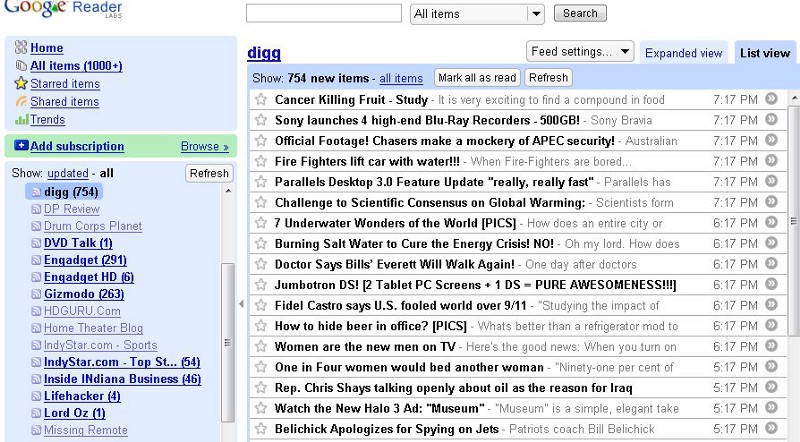
Podcasting is experiencing the same explosive growth blogging experienced in the late-2000s. According to podcast search engine ListenNotes, over 25 million episodes have been published this year, up from 17 million the year before. Like blogs, podcasts are also published via RSS, so most podcast clients embraced a similar subscribe-and-download model that Google Reader employed for blogs, and that model is breaking down in a world where everyone and their mom is starting a podcast. The user experience of most podcast clients is even worse than Google Reader because you can’t easily scan a podcast to evaluate its quality, and everything happens on a much smaller mobile screen.
I started out as a fan of Overcast, but my love for podcasts pushed me to want to discover more of them, so when Breaker launched with the promise of social discovery, I switched. Over the next few years, I accumulated 950 listens and 172 subscriptions, which started to break Breaker. Breaker was constantly downloading new episodes to my phone and replacing old ones I never got to listened to, eating up a ton of mobile data in the process (you can limit data usage in the app). When I chose to go streaming-only, the few seconds of buffering time was a constant source of annoyance. As my behavior changed to accommodate having so many subscriptions, recency-based default sort was no longer ideal and relying on search in Breaker was too slow.
At the beginning of this year, I decided to make the switch to Spotify for podcasts. I was anxious because there’s no way for me to import my precious list of subscriptions, but I gave it a try. I tapped on an episode and it started streaming right away with no buffering time, which felt like magic and sealed the deal. This was exactly how Spotify won over users who were used to downloading songs on iTunes.
“I read in this book that the human brain takes about 200 milliseconds to perceive anything, like at all. I said to the engineering team, we gotta get this down to 200 milliseconds. At that time, that was 2006, that was considered crazy…
We never got it down to 200 milliseconds consistently. We got it down to about half a second but when you play then with things such as the throbber and you actually, cognitively make it move even before there’s sound, the human brain perceives it to be instant even though technically, it wasn’t. There’s a lot of things that you could do, and I got really into the details there of just creating an amazing experience that solved the end goal. I think I was very clear from the beginning that this needed to feel like you had all the world’s music on your hard drive.”
Daniel Ek, Spotify CEO on Masters of Scale podcast.
After a while, the Spotify homepage became more personalized and I started discovering (and re-discovering) podcasts to listen to through recommendations and curated playlists. Search was snappy for when I’m interested in a topic or when I simply want to get to a particular podcast. The “You might also like” section on episode pages also got good at sending me down the rabbit hole of a topic. This is exactly how I want to consume podcasts. You can still “follow” podcasts and see new episodes in “Your Library,” which is equivalent to subscribe-and-download, but Spotify is clearly pushing towards a roam-and-graze, discovery-based model that plays into their advantage.
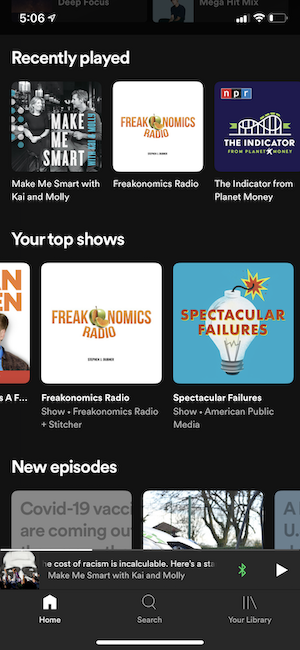
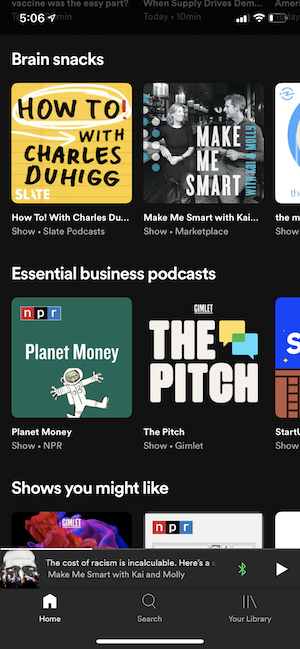
Reading my experience is likely upsetting because it represents yet another triumph of the closed ecosystem. Some people are already upset at Spotify for turning their favorite podcasts into Spotify exclusives. The studios Spotify acquired just this year are already unionizing to defend their interests. Joe Budden straight up picked up and left.
On the other hand, through the purchase of Megaphone, the introduction of Streaming Ad Insertion along with way better metrics and targeting to advertisers, Spotify is poised to grow the podcast business. Their superior user experience enabled by roam-and-graze will expand the market by bringing in new audiences.
I wonder what opportunities, if any, will Spotify create for developers in the ecosystem. History here honestly doesn’t look great for innovation, but Spotify can choose differently. They used to be David taking on the music industry Goliath, but now they’re Goliath crushing an open ecosystem. The only player that can bring the fight to Spotify is Apple, and I hear they’ve finally started to beef up their podcast division by acquiring ScoutFM. However, it seems like they’re also interested in owning original content, which is a strategy more aligned with a closed ecosystem.
To end on a more positive note. A service that could be built on top of Spotify is a way for people to easily share their podcast tastes and compare them with friends to discover new podcasts and people to connect with. We built that. Give it a try 🙏
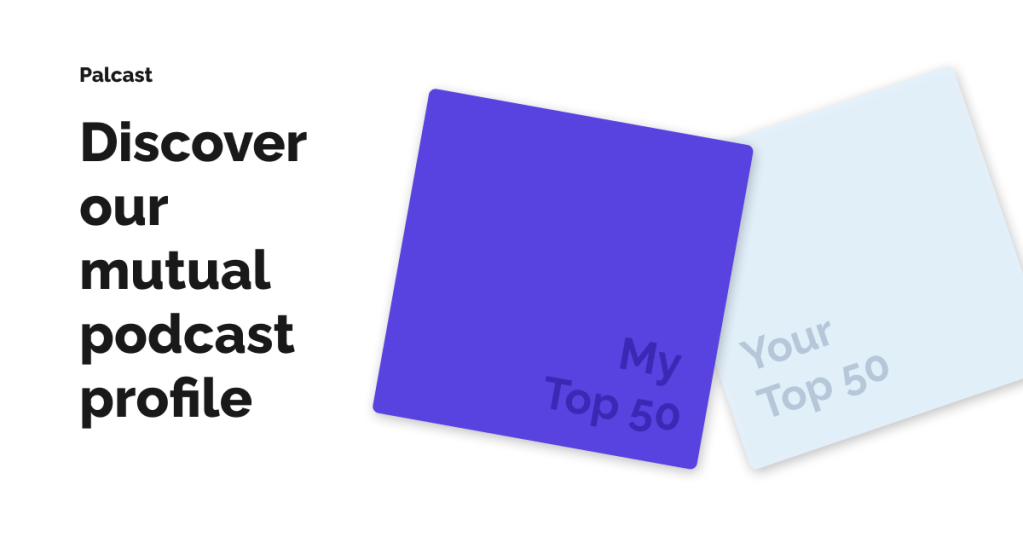
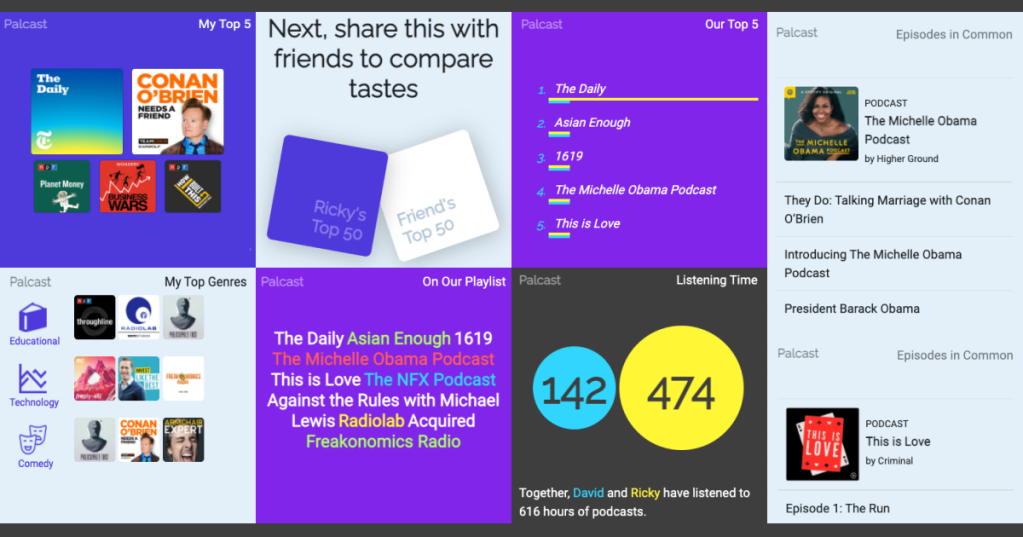
Ricky’s co-founder here! I initially was reluctant to switch over to Spotify for podcasts because they seemed like an afterthought/second-class media there. There’s also all the usual arguments in favor of keeping things open, but I can see the power of a closed ecosystem being able to improve the experience for both podcast listeners and hosts— with the RSS spec, hosts can at most know how many times their episodes were downloaded, which just isn’t very useful. The recent addition of mixed music + podcasts Playlists, including the personalized The Get Up morning show, shows some of the potential of having podcasts side-by-side with music. I’m excited for Spotify to recommend podcasts to me, but I’d also like to know which episodes of specific podcasts my friends love!